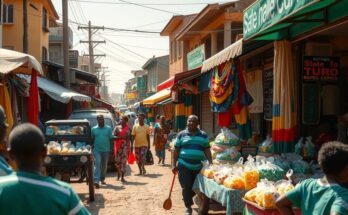Northern Nigerian leaders closed schools for Ramadan, prompting criticism from Omoyele Sowore. He accused them of sending their children to elite schools while public education suffers. The Minister of State for Education condemned the shutdown, stating there is no necessity for it during Ramadan. Critics argue the decision worsens educational inequalities, particularly for disadvantaged children.
The decision by the northern Nigerian states of Bauchi, Katsina, Kebbi, and Kano to close schools for Ramadan has drawn heavy criticism from former presidential candidate Omoyele Sowore. He contends that the leaders promoting this initiative do not experience the ramifications of their actions, as they send their own children to elite institutions rather than public schools which serve economically disadvantaged students.
Sowore highlighted the inconsistency in educational policies, asserting that the leaders are both “irresponsible and wicked,” as their offspring receive quality education abroad or in prestigious local schools financed by public funds. He contrasted this with the plight of poorer children in run-down public schools who are denied the opportunity for education during this religious period.
Following the announcement, Nigeria’s Minister of State for Education, Suwaiba Ahmad, criticized the school shutdown, stating, “nowhere is it stated that schools must be closed for fasting.” She emphasized that many Muslim-majority countries, such as Saudi Arabia, keep education institutions operational during Ramadan, underscoring a stark difference in approach.
Sowore voiced his disapproval on social media, referring to the decision-makers as “ignoramus” and condemning their disregard for the education of less fortunate children. Reports indicate that the affected states, particularly Bauchi, have high out-of-school rates, with the National Bureau of Statistics citing 54% in Bauchi alone.
The former candidate articulated that, should he attain the presidency, he would prohibit religious impositions in governance, as he believes that secularism should prevail in the educational sector. Furthermore, he expressed disdain for the idea of closing schools due to religious practices, denouncing those responsible as uninformed.
The Christian Association of Nigeria (CAN) has also weighed in, labeling the school closures as discriminatory and ineffective. In response to increasing backlash, the Katsina State government announced it would extend the shutdown even to private institutions, indicating strict consequences for non-compliance with this policy.
In summary, the closure of schools during Ramadan by northern Nigerian states has ignited substantial controversy, as many, including Omoyele Sowore and educational advocates, argue it exacerbates educational disparities for the underprivileged. The response from government officials and the criticism from organizations such as the Christian Association of Nigeria further emphasize the contentious nature of the decision, while Sowore insists on the need for secular governance. Ultimately, this situation presents a critical challenge in addressing children’s education amid religious considerations.
Original Source: saharareporters.com




